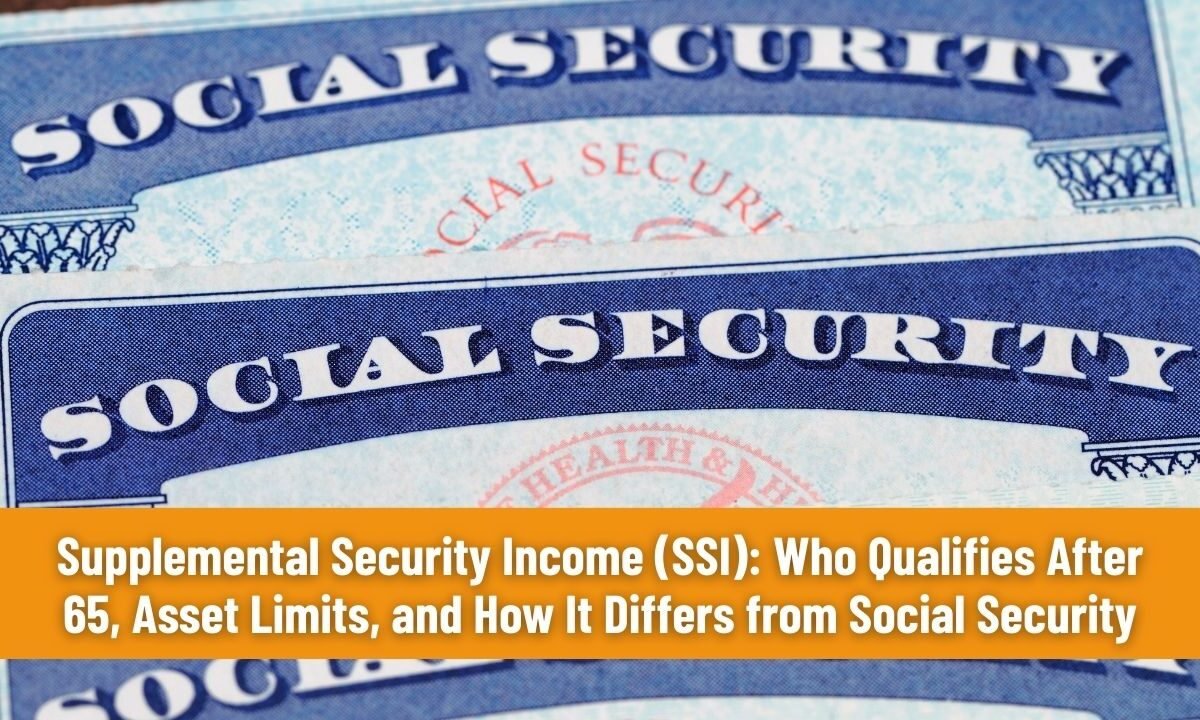For millions of older adults across the United States, Supplemental Security Income (SSI) serves as a critical lifeline. While many seniors are familiar with Social Security retirement benefits, SSI often remains less understood, despite its importance for those with low income and limited assets.
This comprehensive guide explores eligibility, asset and income rules, payment amounts in 2025, and how SSI differs from Social Security. Whether you are nearing retirement or helping a loved one plan their finances, understanding these rules can help maximize benefits.
What is Supplemental Security Income (SSI)?
SSI is a federal program administered by the Social Security Administration (SSA) that provides monthly cash payments to individuals who are:
- 65 or older
- Blind
- Disabled
- AND have limited income and resources
Unlike Social Security retirement or disability benefits, which are earned through payroll contributions and work credits, SSI is strictly need-based. It is funded through general tax revenues, not Social Security payroll taxes.
Key Features of SSI
- Provides monthly cash assistance for basic needs like food, clothing, and shelter.
- Not based on work history – even people who never worked may qualify.
- Offers a safety net for older adults and people with disabilities who struggle financially.
Who Qualifies for SSI After Age 65?
Eligibility depends on age, income, assets, and residency status.
Age Requirement
- Seniors must be 65 or older.
- Younger applicants may qualify if they are blind or disabled.
Income Limits (2025)
SSI counts most forms of income, including wages, pensions, Social Security, and even support from friends or family.
- Individual: $914/month
- Couple: $1,371/month
If income exceeds these limits, SSI payments may be reduced or eliminated. However, not all income counts (more on this later).
Asset Limits (2025)
SSI has strict rules to ensure it only helps those with genuine financial need.
- Individual: $2,000
- Couple: $3,000
Exempt assets (not counted):
- Primary residence
- One vehicle
- Basic household goods and personal belongings
- Certain burial plots and up to $1,500 in burial funds
Citizenship & Residency Rules
Applicants must be:
- U.S. citizens or lawful permanent residents
- Living in the United States or certain U.S. territories
Those with temporary visas or undocumented status are not eligible.
SSI vs. Social Security: Key Differences
Many seniors confuse SSI with Social Security retirement. Here’s how they differ:
| Feature | SSI | Social Security Retirement |
|---|---|---|
| Eligibility Basis | Financial need | Work history & payroll taxes |
| Age Requirement | 65+ (or blind/disabled) | 62+ (early retirement) |
| Funding Source | General tax revenues | Social Security payroll taxes |
| Asset Limits | Yes ($2,000 individual, $3,000 couple) | None |
| Income Consideration | Yes – income reduces payments | No, unless working before FRA |
| Payment Amount (2025) | $914/month (individual max) | Based on lifetime earnings |
Key takeaway: SSI is a needs-based safety net, while Social Security is an earned benefit. Some seniors receive both if their Social Security check is below the SSI threshold.
How SSI Payments are Calculated
SSI benefits depend on:
- Federal benefit rates
- Countable income
- State supplements
- Living arrangements
Federal Payment Standard (2025)
- Individual: $914/month
- Couple: $1,371/month
State Supplements
Many states add extra payments on top of the federal amount. In states like California, New York, and New Jersey, supplements can increase benefits by $100–$300 or more monthly, depending on living arrangements.
Income Deductions
Not all income counts against SSI.
- $20 exclusion on any income
- $65 exclusion for earned income
- ½ of remaining wages are excluded
Example:
If you earn $500/month in wages:
- First $85 excluded → $415 left
- Half of $415 excluded → $207.50 countable income
- SSI reduced only by $207.50, not the full $500
SSI for Seniors Already on Social Security
Many seniors over 65 collect both SSI and Social Security. SSI fills the gap if retirement benefits are too low.
Example
- Social Security benefit: $600/month
- SSI maximum: $914/month
- SSI supplement: $314/month
This ensures no eligible senior’s income falls below the federal minimum standard.
Income and Assets That Affect SSI
Countable Assets
- Bank accounts (checking/savings)
- Retirement funds (IRA, 401k if accessible)
- Extra vehicles or property not used as a home
- Investments: stocks, bonds, mutual funds
Exempt Assets
- Primary home
- One vehicle (used for transportation)
- Household goods and personal items
- Burial funds up to $1,500
Income That Reduces SSI
- Wages from employment
- Social Security benefits
- Pensions, annuities, retirement withdrawals
- Unemployment benefits
- Cash gifts or support
How Living Arrangements Affect SSI
Where you live impacts your benefit amount.
- Living Alone/Paying Rent: Full SSI benefit
- Living with Family: SSI may be reduced if food/shelter are provided at no cost
- Institutional Care (Medicaid covers 50%+ costs): Reduced SSI, usually capped at $30/month
Applying for SSI After Age 65
Steps to Apply
- Check Eligibility – Ensure age, income, and asset rules are met.
- Gather Documents – Social Security number, proof of age, bank statements, proof of income/assets.
- Submit Application – Online at SSA.gov or in-person at a local SSA office.
- Interview – SSA may require a phone or in-person meeting.
- Decision – Applicants receive a notice of approval, denial, or request for more information.
Reconsideration & Appeals
If denied, seniors can:
- Request reconsideration
- Attend a hearing before an administrative law judge
- File an appeal with the Appeals Council
SSI Payments and Asset Rules for 2025
| Category | Individual | Couple |
|---|---|---|
| Maximum Federal Payment | $914/month | $1,371/month |
| Asset Limit | $2,000 | $3,000 |
| Excluded Assets | Home, 1 vehicle, burial funds, personal items | Same per person |
| Income Limit | $914/month | $1,371/month |
| State Supplements | Varies by state | Varies by state |
Why SSI Matters for Seniors Over 65
For older adults with limited income or small Social Security checks, SSI provides:
- Financial security to cover essentials
- Protection from poverty in retirement
- Access to Medicaid in most states (automatically with SSI approval)
This dual safety net helps seniors maintain basic dignity and independence.
Tips for Maximizing SSI Benefits
- Track Your Assets Carefully – Keep countable resources below the limit.
- Understand Exemptions – Don’t mistakenly sell exempt assets like a home or car.
- Report Changes Promptly – SSA requires updates about income, assets, or living arrangements.
- Look into State Supplements – Some states automatically add extra payments.
- Combine with Other Benefits – SSI often makes you eligible for SNAP (food stamps), Medicaid, and energy assistance.
Supplemental Security Income (SSI) is a vital program for seniors aged 65 and older who struggle financially. By understanding eligibility rules, income and asset limits, and the differences from Social Security, seniors can ensure they receive the maximum benefits available.
For those with low income or limited retirement savings, SSI can provide a lifeline—helping to cover food, housing, and medical expenses, often alongside state supplements.
The key is to review finances carefully, apply early, and stay informed about updates from the Social Security Administration. With SSI, older Americans can maintain stability and security in retirement.nd Social Security benefits is crucial to maximize SSI eligibility and monthly payments.
FAQs
Yes, but SSI payments may be reduced depending on your Social Security income. SSI supplements your income to reach the federal minimum level.
The SSA counts cash, bank accounts, investments, and additional properties, while exempting your primary residence, one vehicle, personal items, and limited burial funds.
No, SSI benefits are generally not subject to federal or state income taxes.




